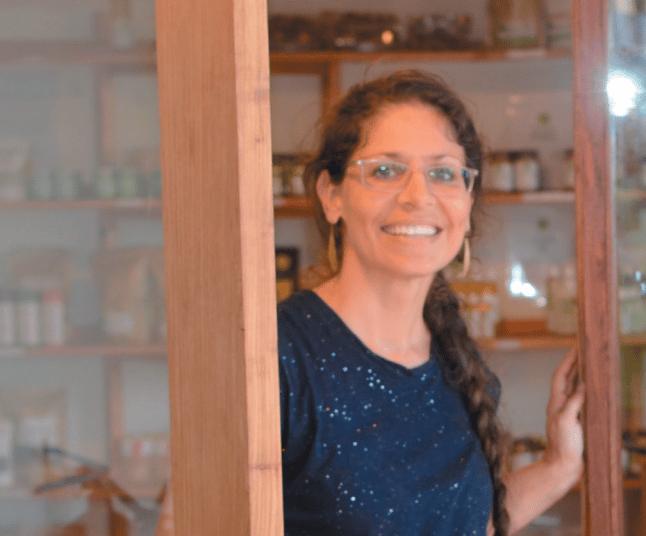There are many small ways to achieve sustainability for Tanzania’s smallholder farmers, as agripreneur Johanna Omere is proving in the green locales of Tanzania.
BY INAARA GANGJI
GROWING UP IN AUSTRIA, JOHANNA OMERE’S life revolved around making things from scratch. Her family carefully baked their own bread, molded their own chocolate, and held the earth close to their hearts at their organic farm. It was a lifestyle inspired by food science and a passion for doing good for their bodies and the world.
Having spent 14 years in Tanzania, Omere has brought this natural zeal straight to the doorsteps of Tanzanians with her social enterprise, I Am Organic.
Omere and her business partner, Jacqueline Namfua, now run an organic restaurant and shop with its own local supply chain, creating an ecosystem that comes with its own unique challenges, but also a renewed sense of hope.
“Local value addition is one of my big passions… to fix systems that are not working the way I envision they should be working… [but] in the beginning, there were hardly any organic products available in Tanzania,” rues Omere.
She was about to open a bakery and, in the process, found her local partner and thereby opened the Wild Flour Café selling organic products made in-house.
“We want to provide excellent services to the community with local job creation and not to export all the high-quality products or resources. We really are passionate about creating and making things here locally.”
However, the local Tanzanian organic market is still in its infancy, she adds.
Consumer and farmer sensitization is low, and there are challenges in transportation, and supply chains have to be built from scratch.
Governments have shown great progress in dialogue both regionally and continent-wide on the issue, but implementation of policy on a large scale remains a problem, attests Mwatima Juma, Chair of the Tanzania Organic Agriculture Movement.
“We are interfering with already-established business. You know, the business of industrial chemicals,” she emphasizes.
Omere only works with smallholder farmers, where organic farming is possible and so is building those relationships for sustainability.
Organizations like Juma’s help coordinate and promote organic agriculture among farmers, distributors and consumers through sharing information so these relationships can form.
But it is not always easy to stay afloat and keep up their daily activities.
“If we get any [financial] support, most of the support is project oriented.” But Juma knows there is opportunity here. She notes that Tanzania is widely regarded as a country not using a lot of chemical fertilizers. And she sees more consciousness among consumers.
However, to meet demand and deal with all these challenges, Omere notes not one person can do it all – the need for collaboration to create awareness is paramount.
Not only agri-businesses, but also organizations like Juma’s that work with farmers are needed to achieve the reality of true organic farming.
“We collaborate with our farmers face-to-face and make them business partners,” says Alexander Wostry, CEO of Operations at Sustainable Agriculture Tanzania (SAT), a non-profit that Omere and other organic agri- businesses in the country work with that engages in training, consultancy and research to improve organic production in the country and region, even on a government level.
Not many Tanzanians are aware of these products, he adds.
Traceability is not a concept that is thought about, agree all three.
“And then we have probably almost 2.5 million hectares in Africa for organic production. But when you look at this, more than 99% of this food is going to export,” he rues.
Farmers in the field have more knowledge and organic practice also assists them to combat soil erosion.
“The conventional agriculture approach has expired.”
However, it is not easy for farmers to switch over. The farmers have the power to transform — it is about creating that community that encourages sustainability, he adds.
But Wostry’s work, like Juma’s and Omere’s, is not easy.
“Our work is not input-intensive, but knowledge-intensive, and labor-intensive, and that needs several stakeholders in place like the government,” he says.
Wostry’s goal is to eventually connect farmers to retailers like Omere and funding organizations like Swissaid and GTZ, to develop this ecosystem.
“On the one hand, [farmers] get better prices for their products because we pay them a premium and we work very closely with them,” says Omere. “And on the other hand, there’s that kind of trust that consumers put in us because they know it’s farm to fork – we kind of took on the challenge.”
While not being profit-oriented as much, the next step is ramping up communication to the customer and penetrating a larger market. SAT has its own products and so do a few other agri-businesses like Omere’s.
“Organic doesn’t just mean less pesticide, but it’s also away of living, a way of producing, a way of processing food, a way of caring for the environment. I think sustainable is a big word, but then there are many small ways to get there.
It’s also a way of keeping up the common consciousness for community, which is really strong on the continent,” emphasizes Omere.
